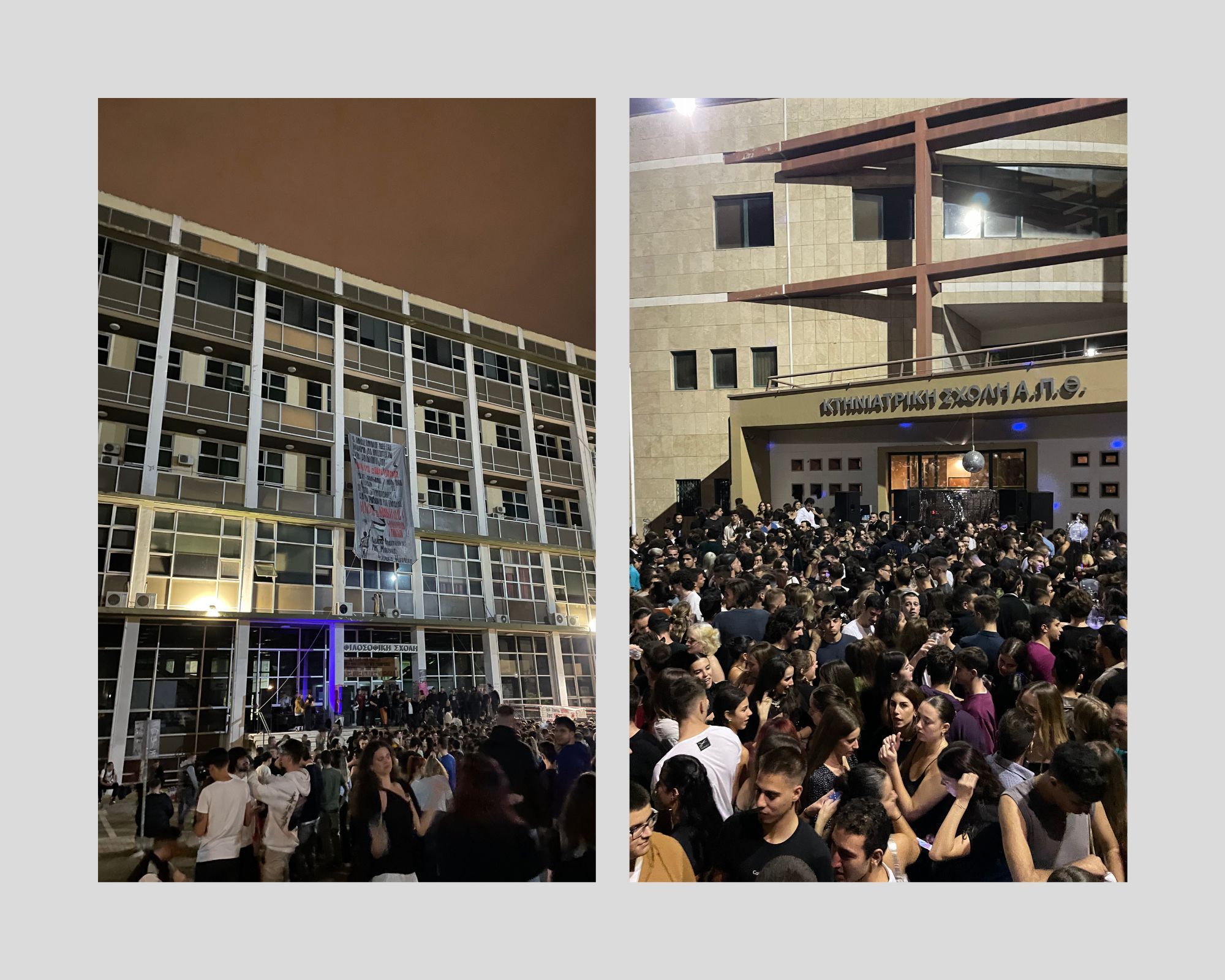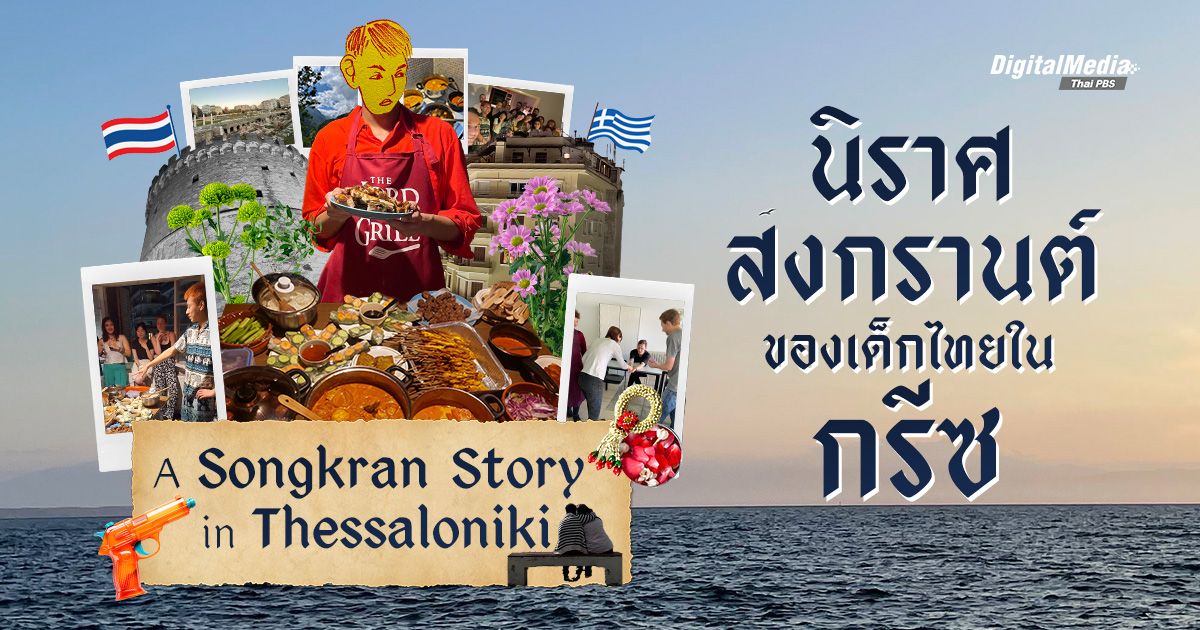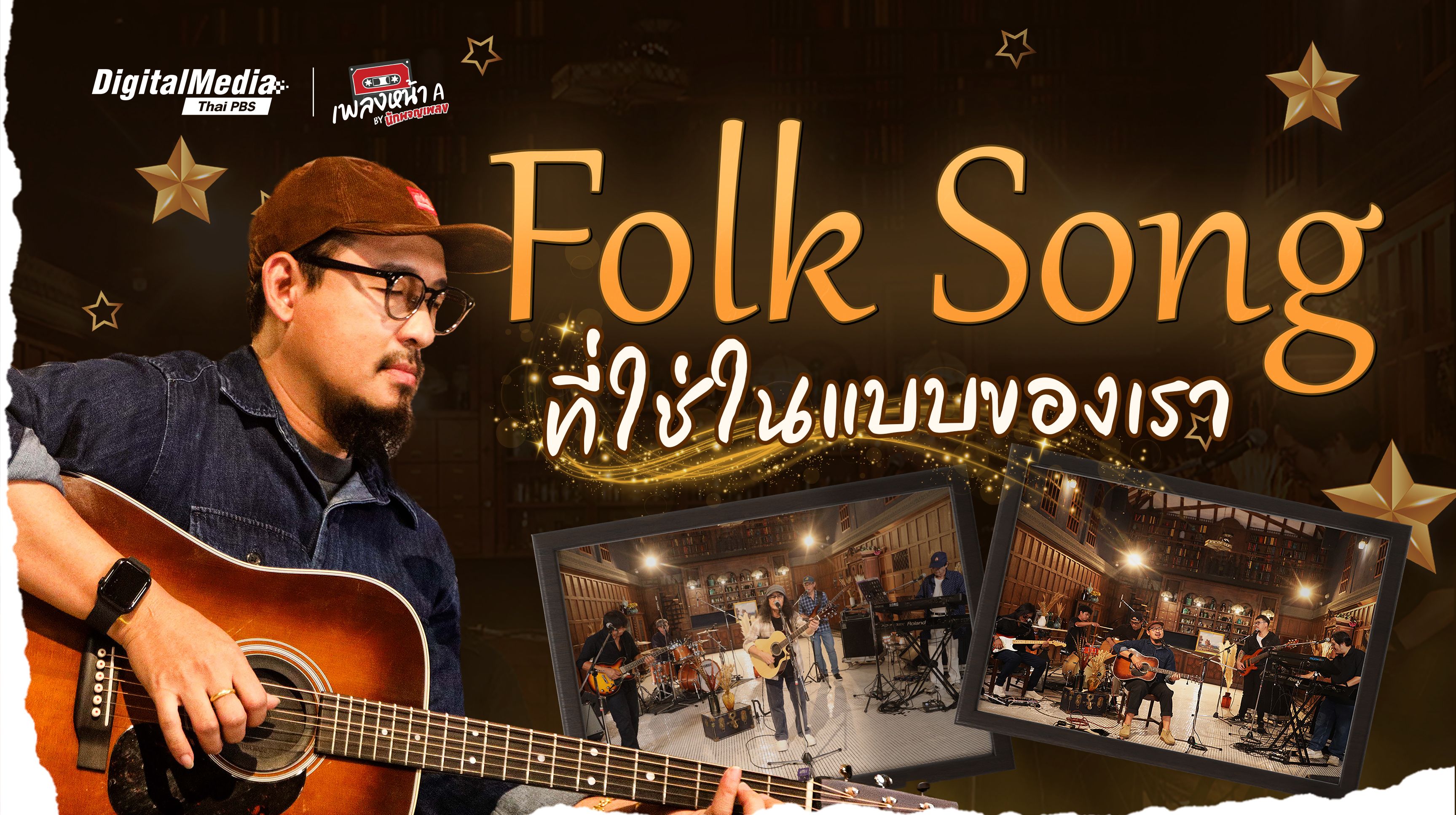บันทึกประสบการณ์การฉลอง ‘สงกรานต์’ ของคนไทยที่เคยไปเรียนและใช้ชีวิตในเมือง ‘เทสซาโลนิกิ’ ประเทศกรีซ │Let’s experience ‘Songkran’ like no other in a city called Thessaloniki.
[Scroll down for the English version]

พอนึกย้อนกลับไป บางที ผมก็ยังสงสัยตัวเองนะครับว่า เคยไปอยู่จุดที่ฉลองสงกรานต์ในกรีซได้อย่างไรกัน…
เกริ่นสักนิดหนึ่งครับว่า เมืองที่ผมเคยไปเรียนและอาศัยอยู่ระหว่างปี 2566-2567 นั้นมีชื่อว่า ‘เทสซาโลนิกิ (Thessaloniki – Θεσσαλονίκη) ซึ่งอยู่ทางตอนเหนือของกรีซ คนไทยคงอาจไม่รู้จักเมืองนี้สักเท่าไหร่เมื่อเทียบกับเอเธนส์หรือซานโตรินี โดยชื่อเมืองนั้นตั้งมาจาก ‘เทสซาโลไนกิ (Thessalonike of Macedon)’ น้องสาวต่างแม่ของ ‘อเล็กซานเดอร์มหาราช (Alexander the Great)’ และคำว่า ‘นิกิ (η νίκη)’ ในภาษากรีกนั้น แปลว่า ‘ชัยชนะ’ ซึ่งเป็นที่มาของชื่อแบรนด์ ‘Nike’ ที่หลาย ๆ คนอาจจะเอ๊ะกันครับ

เทสซาโลนิกิเป็นจุดยุทธศาสตร์สำคัญมาตั้งแต่ยุคก่อนประวัติศาสตร์ ต่อมาถูกพัฒนาเป็นเมืองท่า และปัจจุบันกลายเป็นเมืองศูนย์กลางการเดินทางในยุโรป ช่วงหน้าร้อน นักท่องเที่ยวยุโรปจะบินมาที่นี่เพื่อไปพักผ่อนริมชายหาดที่เมืองใกล้ ๆ และทุกภาคการศึกษา นักเรียนในโปรแกรมอีราสมุส (Erasmus) จากทั่วโลกก็มาแลกเปลี่ยนที่นี่ จากประสบการณ์ของผู้เคยอยู่จริง ผมมักจะพูดติดตลกว่า “เด็กกรีกครึ่งประเทศกับเด็กอีราสมุสอีกครึ่งโลกรวมตัวกัน ไม่ใช่เพื่อเรียนนะ แต่มาปาร์ตี้ต่างหาก” เพราะแทบทุกคืน เด็กวัยรุ่นทั้งท้องที่และต่างชาติต่างออกไปกินดื่มกันตามประสาจนถึงเช้า และตัวเมืองเองก็เล็กกับปลอดภัยมากพอสำหรับทุกคนที่จะใช้ชีวิตในยามวิกาลได้ อีกทั้งเครือข่ายนักเรียนอีราสมุส (ESN: Erasmus Student Network) ประจำเมืองก็ขยันจัดอีเวนต์โดยนักเรียน เพื่อนักเรียน จึงทำให้เทสซาโลนิกิเป็นเมืองนักเรียนอย่างแท้จริงครับ

ต้องบอกเลยว่า เทสซาโลนิกินั้น “เหมือนกรุงเทพฯ” แบบที่ผมเองก็ไม่เคยคาดคิดว่าจะได้เจอในอีกซีกโลกหนึ่ง อย่างย่านที่ผมอยู่ก็คลับคล้ายคลับคลาเยาวราชจนเพื่อนคนไทยทัก เดินลงมาจากหอ ก็มีร้านขายของชำที่ชวนให้คิดถึงร้านขายของอาแป๊ะอาม่าตามตรอกซอกซอยเก่า ๆ ตามถนนและฟุตบาทก็มีหมาจรแมวจัดเดินครองถิ่นกันทั้งเมือง (จริง ๆ ก็ทุกที่เลยนะครับ) ทุก ๆ เช้า ที่ตื่นมาวิ่ง ก็จะเจอคุณปู่คุณย่าขาประจำประคองกันเดินเลียบหาด และที่สุดของแจ้ก็คือ ผู้คนต่างบ่นถึงเรื่องต่าง ๆ ทั้งเศรษฐกิจ การเมือง สถานการณ์ของประเทศใน ‘ยุคนายพล (Greek junta era)’ ช่วงปี ค.ศ. 1967-1974 และรถไฟฟ้าใต้ดินของเมืองที่สร้างนานพอ ๆ กับถนนและรถไฟฟ้าบางสายในกรุงเทพฯ (เพิ่งจะแล้วเสร็จและเปิดใช้ไปเมื่อเดือน พ.ย. ที่ผ่านมา) ส่วนเรื่องอาหารการกินนั้น ที่กรีซมีประเภทร้านอาหารที่เรียกว่า “มากีเรฟตา (μαγειρευτά - แปลว่า ปรุงแล้ว)” ซึ่งคล้ายกับร้านข้าวแกงในไทยไม่มีผิด แต่ต่อให้กรีซจะเหมือนไทยอย่างไร บ้านก็ไม่ใช่บ้านอยู่ดีครับ

สิ่งหนึ่งที่ผมพอจะทำแก้คิดถึงบ้านได้คือ การทำอาหารไทยครับ ก่อนจะย้ายไปกรีซ ผมซื้อเครื่องปรุงสำเร็จรูปต่าง ๆ พร้อมบะหมี่กึ่งสำเร็จรูปไปประมาณหนึ่ง เพราะรู้ตัวว่าตัวเองจะได้ทำกับข้าวแน่ ๆ ต่อให้ฝีมือจะไม่ได้ดีก็ตาม พอไปถึงก็ตามคาดครับ เทสซาโลนิกิไม่มีร้านอาหารไทย แต่ที่รับไม่ได้จริง ๆ ก็คือ พริกป่นในกรีซนี่... ไม่มีความเผ็ดใด ๆ เลยครับ ผมจะเข้าครัวในหอตอนที่เบื่อกับข้าวโรงอาหารมหาวิทยาลัย (ซึ่งฟรีและ “ซ้ำ” ได้ด้วยหากไม่อิ่ม) และไม่อยากกินข้างนอก สิ่งที่ทำก็ง่าย ๆ ครับ หมูกระเทียม กะหล่ำปลีผัดน้ำปลา (ผัดทีนี่ กลิ่นคลุ้งไปทั้งหอจนรูมเมตจะบ่นเอาได้) เมนูสารพัดไข่ และข้าวที่หุงในหม้อต้มบะหมี่หม้อเล็ก ๆ อย่างไรก็ดี การกินอาหารไทยคนเดียวบ่อย ๆ ครั้ง ก็เหงาเกินไปใช่ไหมครับ เราต่างเคยชินกับการแบ่งกับข้าวกับครอบครัวหรือเพื่อนฝูงตามฉบับคนไทย ทีนี้ ผมก็เกิดดำริที่จะจัดปาร์ตี้อาหารไทยบ้าง และก็ “หาทำ” จนจัดได้ 3 ครั้งถ้วนครับ
รอบแรก ผมยืนผัดกะเพราและต้มไข่พะโล้กินกับเพื่อนร่วมโปรแกรมชาวโคลอมเบีย 2 คนช่วงวันคริสต์มาส รอบสอง ก็เล่นใหญ่ขึ้นมาหน่อยครับ เพราะหาเรื่องจัด “โต๊ะจีน” ตอนวันตรุษจีนเลี้ยงคน 13 ชีวิต รอบนี้ ผมนึกอยากทำหมูกรอบทั้ง ๆ ที่ไม่เคยทำ ก็เปิด YouTube หาสูตรและวิธีที่ง่ายที่สุด จนเจอว่า แค่มีหม้อใบใหญ่ ๆ แล้วทอดหมูซ้ำ 3 รอบ ก็ได้หมูกรอบแล้วครับ ถึงทำจริง หน้าตาหมูกรอบผมอาจจะไม่เหมือนอย่างที่เคยกิน ๆ มา แต่รสชาติก็ไม่ขี้เหร่ แถมเพื่อนต่างชาติมารุมกินหมูกรอบจนหมดเป็นจานแรกเลย

หลังได้การตอบรับที่ดีตอนตรุษจีน ผมก็เริ่มวางแผนจัดงานสงกรานต์ที่หอของตัวเอง - ซึ่งตรงกับวันที่ 13 เม.ย. 67 พอดี อย่างแรกที่ต้องคิดคือ จะทำกับข้าวอะไรเลี้ยงเพื่อน ๆ และแขกเหรื่อดี จนได้เมนูที่มาพร้อมกับเรื่องราวทั้งส่วนตัวและไม่ส่วนตัวครับ อย่างแรกคือ สะเต๊ะหมูกับไก่ที่เป็นดั่งการรำลึกถึงบรรพบุรุษไปในตัว เพราะพ่อของผมชอบเล่า (หรือให้พูดว่า “ขิง” น่าจะถูกต้องกว่า) ว่า ย่าทวดทำสะเต๊ะขายที่คลองดำเนินสะดวกตอนพ่อเด็ก ๆ และเป็นสะเต๊ะที่อร่อยที่สุดที่พ่อเคยกินมา ส่วนอาหารจานที่สองเป็นแกงมัสมั่นเนื้อน่องและมังสวิรัติ เหตุผลก็ง่าย ๆ เลยครับ คือมัสมั่นเคยเป็นแกงที่ดีที่สุดในโลก และต่างชาติหลายคนก็ไม่รู้เรื่องนี้ แต่จานที่ขายดีที่สุดในคืนวันสงกรานต์คือลาบทอดหมูครับ กินกันเกลี้ยงจนตัวคนทำเกือบไม่ได้กิน สุดท้ายแต่ไม่ท้ายสุด คือชานมไข่มุกแบบพร้อมชงที่เอาไปจากไทย เอาใจเพื่อนเวียดนามกับจีน พอยังเหลือซองที่ไม่ได้กิน ผมก็ยกให้สาว ๆ สาวกชานมทั้งสองไปครับ น้ำใจคนเอเชียที่แท้

แต่ผมก็ไม่ได้เตรียมงานสงกรานต์คนเดียวนะครับ งานสงกรานต์ทั้งที ทุกคนก็ต้องรวมใจกันอยู่แล้ว อย่างเพื่อนเวียดนามของผมก็ให้ยืมหม้อหุงข้าว – ที่ได้ต่อจากเพื่อนร่วมโปรแกรมคนจีนที่เคยอยู่เทสซาโลนิกิอีกที – ทำให้เราหุงข้าวสวยได้ถูกต้อง ไม่ต้องลำบากหุงในหม้อต้มบะหมี่อย่างที่ผมหุงกินเอง หรืออย่างรูมเมตคนอังกฤษในหอผมก็ทำเปาะเปี๊ยะผักสดมาแชร์กัน น่าคิดและตลกดีนะครับที่ในโลกตะวันตก เรียกเปาะเปี๊ยะสดและเปาะเปี๊ยะทอดว่า ‘summer rolls’ และ ‘spring rolls’ ผสมปนเปสลับกันไปมา... กลับมาที่งานเลี้ยงสงกรานต์กันต่อครับ เด็ก ป.ตรี คนฝรั่งเศสที่รู้จักกันก็ทำสลัดผลไม้สูตรเด็ดของเขามา ส่วนรูมเมตคนฝรั่งเศสกับเพื่อนของเขาก็ช่วยกันเตรียมคุกกีช็อกโกแลต และเพื่อน ๆ และเพื่อนของเพื่อนคนอื่น ๆ ก็ซื้อเครื่องดื่มและขนมเข้ามาเพิ่ม จนสุดท้าย คืนนั้นมีคนฉลองสงกรานต์ในหอผมรวม 20 คนถ้วน
แต่สงกรานต์งานนี้จะไม่ใช่สงกรานต์เลยถ้าไม่มีการเล่นน้ำใช่ไหมล่ะครับ ผมเลยมีปืนฉีดน้ำจิ๋ว ๆ อยู่สามอันให้ทุกคนผลัดกันฉีดน้ำตามความสะดวก “ดูสิ นี่เหมือนฉันฉี่รดตัวเองเลย” เพื่อนของรูมเมตผมคนหนึ่งบ่น “เดี๋ยวมันก็แห้งแหละคุณ” ผมขำเบา ๆ ตัดมาตอนที่เพื่อนคนกรีกกำลังวิ่งไล่ฉีดน้ำใส่กัน เด็ก ป.ตรี คนฝรั่งเศสก็หยิบปืนฉีดน้ำอีกอัน ทำท่าลังเลว่าสิ่งนี้คืออะไร “มา มาฉีดใส่เรานี่ นี่สงกรานต์นะ” ผมบอกเขา “ไม่ได้สิ เธอเป็นเจ้าบ้าน ฉันจะแกล้งเธอได้อย่างไร” เจ้าตัวพูด แล้วก็ฉีดน้ำใส่ผมเบา ๆ… หลังจบงานเลี้ยงคืนสงกรานต์ไปวันสองวัน ผมก็มีพิธี “รดน้ำดำหัว” ให้เพื่อนร่วมชั้นเรียน (ที่อายุมากกว่า) และครูสอนกรีกที่โรงเรียนภาษากรีกด้วย ก็ต้องรียูสปืนฉีดน้ำมารดน้ำแทนการใช้ขัน ดูตลกแปลก ๆ แต่น่ารักไปอีกแบบครับ

คืนงานเลี้ยงสงกรานต์ในเทสซาโลนิกิ ถือเป็นความทรงจำที่ดีมาก ๆ ของผมตอนที่อยู่ในยุโรปครับ มันไม่ใช่แค่คืนคืนหนึ่งที่เด็กมหา’ลัยมาสังสรรค์กันเฉย ๆ แต่ยังทำให้ผมได้ตกผลึกความคิดบางอย่าง อย่างแรก ไม่ว่าในโอกาสใดก็ตาม มื้ออาหารนำพาผู้คนหลากหลายให้มาเจอกันเพื่อแบ่งปันเรื่องราว แลกเปลี่ยนมุมมอง และสำรวจ “ความเป็นอื่น” ไปด้วยกันครับ อย่างที่สองคือ ในแง่หนึ่งนั้น การเป็นนักเรียนต่างชาติในต่างแดน หมายความว่า คุณก็เป็นทูตวัฒนธรรมด้วย อย่างผมเองก็ได้เรียนรู้วัฒนธรรม สังคม และวิถีชีวิตในกรีซ (ยกเว้นตำนานเทพเจ้ากรีกที่ไม่เคยเข้าหัวเสียที) และในทางกลับกัน ผมก็มีโอกาสนำเสนอความเป็นไทยเท่าที่พอจะทำได้ พอพูดอย่างนี้แล้ว ส่วนตัวผมคิดว่า รัฐควรจะส่งเสริมและโปรโมต ‘ซอฟต์พาวเวอร์ไทย’ อย่างที่มันเป็นจริง ๆ เพื่อให้ทุกคนได้เห็นว่า เมืองไทยไม่ได้มีแค่ผัดไทย มวยไทย หรือข้าวเหนียวมะม่วงแค่นั้น
และสิ่งสุดท้ายที่ผมได้เรียนรู้นั้นคือ เราควรรู้สึกดีใจเมื่อได้พบเจอผู้คนดี ๆ และน่าจดจำ ไม่ว่าช่วงเวลาที่อยู่ด้วยกันนั้นจะสั้นหรือยาวก็ตาม ตัวผมเองก็ยังดีใจที่ได้พบเจอผู้คนเหล่านั้นในกรีซ และจะคิดถึงพวกเขาเสมอเมื่อวันสงกรานต์เวียนมาถึงในทุก ๆ ปีครับ
ติดตามเนื้อหาเกี่ยวกับ 'ซอฟต์พาวเวอร์ไทย' ในหลากหลายมุมมอง จากเครือ Thai PBS
- ‘วงการหนังไทย’ กับอนาคตอันสดใส (เป็นพัก ๆ ?) I Thai PBS NOW
- ซอฟต์พาวเวอร์ “ต้องใช้เวลา” ส่องต้นแบบจากต่างแดน I Policy Watch
- ซอฟต์พาวเวอร์ นวดไทยอะไรต้องทำต่อ I Big Story เรื่องใหญ่ ไทยพีบีเอส
ติดตามบทความและเรื่องราวทันทุกกระแสที่ Thai PBS NOW: www.thaipbs.or.th/now

Looking back, I still can’t believe I got a chance to celebrate Songkran, or Traditional Thai New Year, in a city called ‘Thessaloniki’…
Thai people might not know Thessaloniki well, compared to Santorini and Athens, but the Europeans might. Thessaloniki (which I prefer to call “Salonica”) is one of the most popular destinations in Europe as it might be cheaper and more convenient to travel for them - to spend their vacation on the beaches near the city - than coming to Asia.
Particularly, every year thousands of Erasmus students choose Thessaloniki as part of their mobility plans. Well, I did too. I didn't know anything about this city or Greece at all, and that’s why I chose Thessaloniki for the second year of my master’s degree, from September 2023-July 2024. I always tell this joke to people that both local and international students there “study hard, party pretty much harder” because you can see many of them roam around all night, bar after bar, nightclubs one after another. And the city is walkable and safe enough for anyone to do so. Besides, ESN Thessaloniki vigorously organizes all kinds of activities for the “Thesserasmus” students every semester, so it encourages students to live their lives and share moments.

Anyway, it had been kind of interesting to me, choosing to live somewhere completely unfamiliar for a whole year. However, I later found out that somehow Thessaloniki felt like Bangkok: people live in crowded low-rise commercial/residential buildings like in Bangkok’s Chinatown; you get to greet stranger elders on the streets every morning; there are some grocery stores whose owners kind of have a vibe of Thai-Chinese grandparents; lots of stray animals wander all around; the locals always complain about politics, economy, the era of the Greek junta back in 1967-1974; people joke(d) about the never-ending construction of the metro (it was finally finished last November); “mageirefta” (μαγειρευτά – cooked) restaurants are comparable to “rice-curry” places in Thailand, and so on. Despite such similarities, it wasn’t “home”.

That was the reason I started to cook to be just a little bit closer to home. Before moving to Thessaloniki, I bought some pre-made ingredients and instant noodles from Bangkok as supplies in case of craving Thai food. And I was right to do so. Thessaloniki doesn’t have Thai restaurants, and the worst part is chili flakes in Greece are not spicy AT ALL! When I was bored of food at the university’s canteen, which is free to students, I came back to the flat and cooked for myself. But having Thai food alone wasn’t right for me. Thai food is not just food: it brings people together to share dishes, emotions and quality time. More importantly, by sharing dishes, people can try out new flavors and open their hearts to differences whether they are going to like them or not. So, I tried to find special occasions to cook for my peers. I ended up organizing three Thai dinner parties.

The first two times were Christmas Eve and Chinese New Year, which I considered “a practice”. During the Chinese New Year, I even managed to cook crispy pork belly for the first time despite utensils in the kitchen. Following the successes, I planned for weeks the third, last and biggest Thai dinner party in Salonica: the Songkran one. Each dish I’d chosen to cook had its story. The highlight one would be pork and chicken satay sticks. I had never cooked satay before. But I’ve always heard my father say how delicious my great-grandmother’s satay sticks were as she sold them at the Damnoen Saduak floating market decades ago. So, in a way, the satay dish was a commemoration of my ancestors. I also cooked massaman curry, which was named the best curry in the world a few years ago, into two dishes: beef shank and vegetarian. Strewed for hours, the beef one was almost perfect until I forgot to top it with some peanuts while serving, which was too bad. Anyway, the star of the night was my “larb-tod”, or Northeastern Thai spicy deep-fried meatballs, because it was finished in a blink of an eye. I also bought instant bubble tea as a drink on the house, particularly to please my fellow Asian friends: they liked it so much that I gave them the remaining sachets.

It wasn’t only me who prepared everything that night. My Vietnamese friend lent me her rice cooker: she’d gotten from a Chinese student in our promotion who had lived there the previous year. So, we had our rice cooked properly. My English roommate prepared some nice fresh spring rolls: we once wondered what is the difference between ‘spring rolls’ and ‘summer rolls’ and we got no clear answer. Some would argue that summer rolls are fried and the spring ones are served fresh, but some places call fresh rolls ‘summer rolls’. Anyway, back to the Songkran party, a French undergraduate girl from Erasmus prepared her signature fruit salad, perfectly refreshing and balancing the spices of my dishes. My French roommate and her colleague prepared some sweets for us. My other friends and guests brought drinks, desserts and joy to the party.
Eventually, exactly 20 people came to the flat that night, eating and water-fighting with each other with mini water guns I’d bought. “It looks like I peed myself”, one of my English roommate’s friends said to me. “Well, it dries fast”, I laughed. Then the Greek girls took two water guns, playing hide and seek in the kitchen. The French undergrad hesitantly took the third water gun while talking to me and my Vietnamese friend. “Just shoot me with that. Come on! This is the water festival”, I encouraged her to use the water gun. “But you are the host, I can’t shoot you”, she answered, then shot me, just a bit.
In addition to the Songkran dinner party, I did a little ritual at the Modern Greek school a few days after to pay respect to my classmates (who were older than me) and the Greek teacher. In Thailand, Songkran also serves as National Elderly Day where the young gently pour water on elders’ hands to ask for blessings. Since I didn’t have any Thai-style water dipper, I used the mini water guns instead. It looked a bit funny and “quirky” (I knew this word thanks to my English roommate), but also lovely and warm in a way.

The Songkran dinner party was one of my memorable experiences while living in Europe. Not just another night where some college kids hung out, it taught me some lessons. Whatever the occasions are, meals bring people together and mark some kind of solidarity: everyone comes to share, exchange ideas and explore the Other. Also, being a foreign student, you are in some way a ‘cultural ambassador’. I learned considerably about Greek culture, history and a bit of everything (except Greek mythology which I still suck). In return, I presented, in my way and with my capacity, Thai culture to people who might have not known anything much about Thailand. Speaking of which, I think that relevant public organizations should promote ‘Thai soft power’ as it is – to show that our culture is more than pad thai, muay thai and mango sticky rice.
Ultimately, we should be grateful to meet wonderful people no matter how long it lasts. I am still glad to have met some of them in Salonica whom I will miss and remember every Songkran.
Explore more about Thailand with Thai PBS World
- Exploring Thailand's popular expat hubs from Pattaya to Phahurat
- How feasible is the idea of Phuket as a crypto hub?
- Equal marriage law celebrated by LGBTQ community in Thailand
Thai PBS World, we bring Thailand to the world: world.thaipbs.or.th

Dedicated to all the people I met during my CLE years.
Σε όλους όσοι γνώρισα στα χρόνια μου με τον CLE.
Special thanks: Maïté G., D. Thanh Thanh D., Zara R., ESN Thessaloniki and Erasmus Mundus Master Course in European Literary Cultures (Master CLE).
Written by: Peerachai “Pete” Pasutan






















